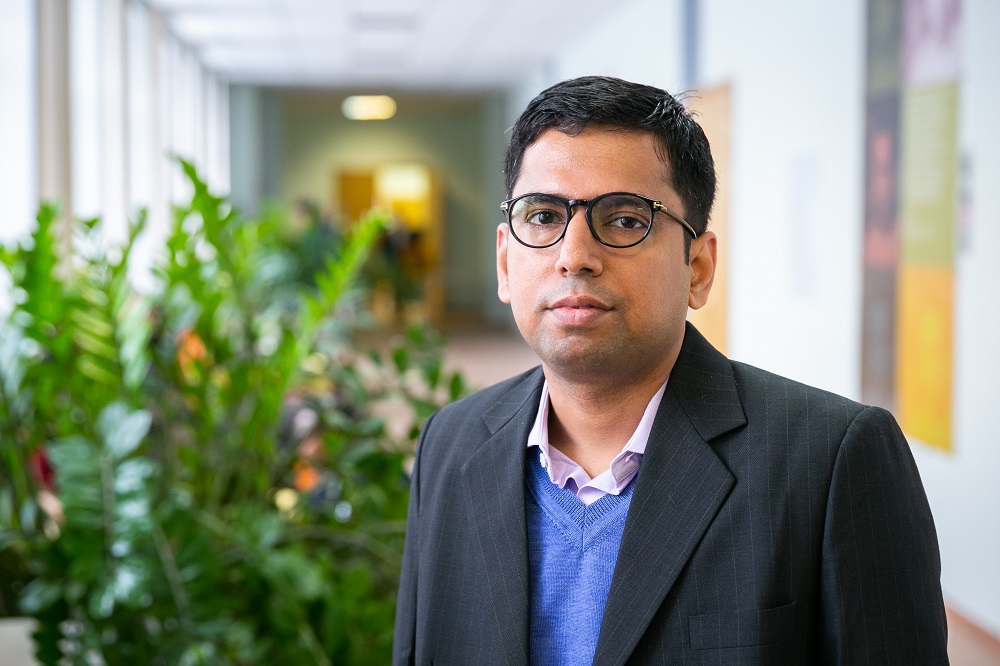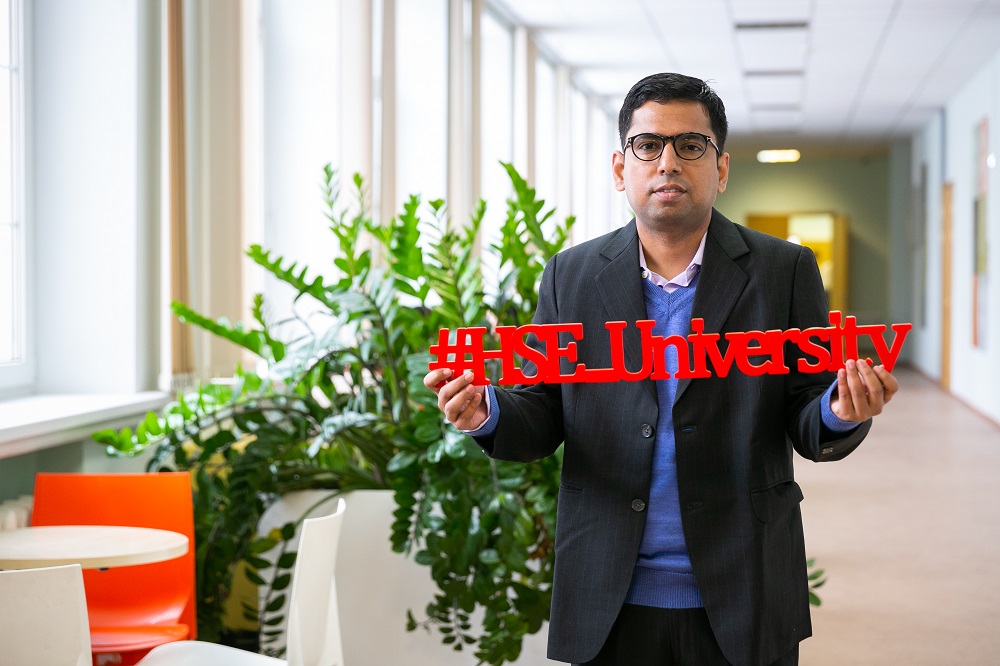‘Big Data Systems Programme Is the Perfect Amalgam of Business, Analytics, and Informatics’

Sangam Kumar Singh has come from India to do a Master’s in Big Data Systems at the HSE School of Business Informatics in Moscow. He has chosen HSE due to its high standing in global university rankings such as QS and the Times Higher Education ranking as well as its focus on research and innovation. Having started his career in engineering within telecommunication business and later moving onto R&D application and analytics in the same area, he was drawn to HSE’s programme because it combines business, informatics and analytics and equips its graduates with the skills and knowledge required by our modern economy and ever-changing market dynamics.
Studying and living in Moscow is certainly quite different from India but at the same time it is also similar, because Russia and India both have rich historical traditions. Also, Moscow is a big city - it's vibrant and the people are nice and very polite. It's in some ways like any big Indian city where you can meet a lot of different people.
I enjoy the lectures and the general design of the curriculum at HSE. It is clear that a lot of effort was put into ensuring the programme meets the demands of the 21st century. After all, we are working at a time when something that was innovative yesterday could be obsolete the next day. So, you have to learn to adapt. The Big Data Systems programme is designed in such a way that you learn things from the past and but also talk about the present, what is happening right now, and then the future aspects.
After completing the Big Data Systems Master's programme, I look forward to putting my knowledge gained here into practice in business. For example, everybody wants the best product in the market. How are you going to compare? When I was working in customer interfacing, it wasn’t that the company was the only one that had that product. Similar products were available from other companies (competitors). How do you innovate within your business, so that you can fulfill the needs of the customer, at lightning speed to boot? Innovation is key to drive any business, so I see myself returning to the industry with new ideas.

Developing a Business Idea
As part of Enterprise Architecture course, we have individual assignments and group work assignments, where we have to collaborate with people. The advantage is that we have a diverse group in the class. Students are from India, Africa, Bangladesh, South Korea, Austria, Russia and CIS countries. You work with everybody in a group assignment, people share their ideas, and there is an exchange of knowledge. It is interesting.
One group assignment was to develop a business idea. I chose a topic related to education because I feel that education is very important and a human right. You should get a minimum level of education, irrespective of which part of the world you live in. The name of the business idea I came up with is ‘Math in My Pocket’. It is aimed at closing educational gaps in society, and it is targeted at primary students. What we are seeing now is that mathematics is required everywhere, and, in my experience, people who tend to do well in math tend to do well in life, so it is very important. But mathematics can be an intimidating subject. So you have to make sure that kids find it interesting and know there is nothing to be afraid of. In fact, I read an article on The Washington Post about parents passing on their fear of math to their kids. That's why I had this business idea.
The plan is to develop an app. It is also going to target specially-abled children. The app will be in the form of a game, because we are talking about small kids. That means, for example, if the kid is doing well, if they are able to answer some multiplication problems or other arithmetic, they get a badge, or some kind of animation, or an additional life which keeps them motivated and engaged.
Learning from Russian Industry Experts
One thing I’ve found particularly interesting is learning about how business, informatics and analytics in industry are done in the Russian market. That is an experience which people perhaps are not going to get if they are not here. We have many guest speakers coming from the industry. They mostly talk about the local Russian market, which is very interesting to hear.
What I’ve noticed is, no matter who the guest speaker is, they mostly talk about the oil & gas industry. It seems that all the biggest IT projects are in the oil & gas industry. The market and the demand in Russia are mostly domestic because the domestic demand is so high.
There is also a big difference in the way the problems are looked at. Since Russia has traditionally been good in some engineering areas, such as physics and mathematics, I see a lot of application of these concepts. Many professors of my programme have a background in mathematics and physics and yet they teach business or informatics. It’s quite interesting because it's a different way of connecting the dots.
When it comes to the usage of software application packages, it remains the same, and as in India, here also people are encouraged to create their own start-ups and develop products. For example, I learned that some of the companies are developing their own cloud-based product. They understand that they can create a world-class product and compete with the leading players. Russian companies are engaged in different research areas and it’s nice to have the opportunity to learn about their expertise during guest talks and seminars.
See also:
‘These Are Very Promising Specialists in Product Management and Data Analysis’
HSE University launched the Master’s in Data-Driven Communication in 2019. The programme is aimed at promising managers who want to master modern technologies for working with clients. It trains professionals in product management and marketing who know how to work with data and AI.
Faculty of Computer Science Lab Develops Monitoring System for LHC Experiment
Researchers from the Laboratory of Methods for Big Data Analysis (LAMBDA) at the HSEFaculty of Computer Science have created a monitoring system that is used in the Large Hadron Collider beauty experiment (LHCb). The system helps track the quality of the collected data and allows operators to quickly find errors.
Economic Empowerment at HSE University
HSE University alumna Dr. Elena Podkolzina recently became an academic supervisor of the newly established master's programme in Economics and Economic Policy. Having been part of HSE University for nearly 25 years now, Dr. Podkolzina recalls her student years and shares her experience as deputy director of the Center for Institutional Studies.
‘We Facilitate High-Speed Car Crashes and Study How Car Engines Work Based on Photos of Flying Debris’
Nikita Kazeev holds a Candidate of Sciences degree (Russian equivalent of a PhD) in Computer Science and a PhD in Physics. He is a Research Fellow at the LAMBDA Laboratory and works at CERN. In an interview with HSE News Service, he talked about what it was like to defend his dissertation in a double doctoral degree programme at HSE University and Sapienza University of Rome, what it is like to conduct research in Geneva, and why it is imperative to communicate with colleagues.
‘Completing My Studies in Russia Has Always Been My Dream’
Ismail Kayali, from Aleppo, Syria, earned his MS in Big Data Systems from the HSE Faculty of Business and Management in 2018. He is currently pursuing a PhD in Informatics and Computer Engineering at the HSE School of Data Analysis and Artificial Intelligence.
‘My Time at HSE Will Always Be Special for Me’
Sangam Kumar Singh is currently finishing the second year of his Master of Science in Big Data Systems. After spending the first year at HSE Moscow, he has gone to the UK on a double degree track with Lancaster University. Sangam has talked to HSE News Service about his studies, hobbies, research interests, and future plans.
Social Media as a Lens on Collective Emotion
During the XX April International Academic Conference on Economic and Social Development, scheduled this year for April 9-12 at the Higher School of Economics, Dr David Garcia of the Complexity Science Hub Vienna and the Medical University of Vienna, Austria will present a report entitled ‘The digital traces of collective emotion’ at a session on ‘The Wellbeing of Children and Youth in the Digital Age.’ Ahead of the conference, Dr Garcia spoke with the HSE News Service about his conference presentation, his research, and plans for ongoing collaboration with HSE colleagues.
Graduation Ceremony for the Double-degree Master’s Programme in Big Data Systems
On June 29, the third graduation ceremony for the double-degree Master’s programme in Big Data Systems (HSE, Russia) and Information Systems Management (UAS Technikum Wien, Austria) was hosted at the Austrian Ambassador’s Residence in Moscow. Dr. Hartmut Koller-Lenhardt, Chancellor at the Embassy of Austria in Moscow, gave the opening address. He congratulated the graduates on their successful completion of the programme and stressed the importance of cooperation between the universities in regards to cultural and professional communication and connections.
Leading Researcher at the HSE Faculty of Computer Science Coordinates New Experiment at CERN
Fedor Ratnikov, a leading researcher at the Laboratory of Methods for Big Data Analysis (LAMBDA), has been appointed project coordinator in the SHiP collaboration. He will be responsible for developing and designing the detector’s active magnetic radiation shielding.
Data Culture: HSE Will Teach All Its Students to Work with Data
HSE will launch a new project called Data Culture in September 2017. Starting their very first year, HSE bachelor’s students will learn to work with data, and students in a number of programmes will also become familiarised with methods of machine-learning and artificial intelligence.


